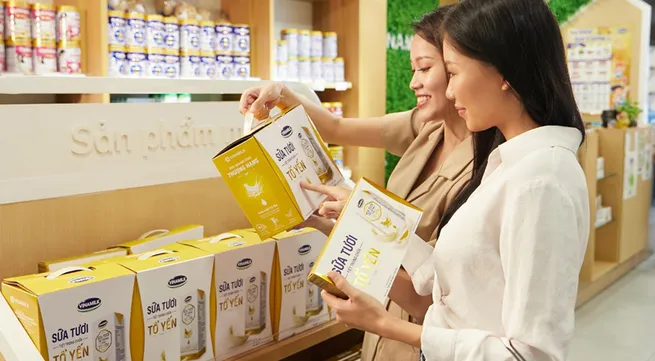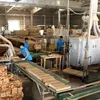Vietnamese products confidently conquer fastidious markets

Vietnamese goods favoured by many choosy markets
Following organic fresh milk and soya bean milk, Vietnam Dairy Products JSC, Vinamilk, exported the first batch of UHT fresh milk with bird’s nest to Singapore. According to their product distribution partner in Singapore, the potential of this product is huge because there is currently no product similar to it on the market.
In addition to the special taste of fresh milk combined with bird’s nest, this premium nutritional product has a great advantage in the Singaporean market.
Representative of the distribution company in Singapore, Ivan Tan said that people in Singapore have a high standard of living and are willing to pay for high-quality and healthy products. In particular, as the pandemic develops, Singaporeans are looking for healthier lifestyles and tend to buy more imported products as they are currently restricted from traveling.
Earlier, Vinamilk’s organic fresh milk product was first exported to Singapore in 2019, one of the most demanding markets in Southeast Asia in terms of import standards and consumer tastes.
It was followed by the successful export of milk made with nuts, including walnuts, almonds and red beans, to the country. Vinamilk is one of several pioneer enterprises to invest in the technology needed to produce high-quality products to export to demanding markets.
Deputy Director of the Import-Export Department under the Ministry of Industry and Trade Tran Thanh Hai said that Vietnamese goods exports have not only increased their presence in established markets, but also now feature in new markets with great potential and have effectively taken advantage of free trade agreements (FTAs).
Accordingly, Vietnam's exported goods have reached most markets in the world with many products gradually gaining a firm foothold and improving their competitiveness in markets with high requirements regarding product quality such as the EU, Japan, the US, Australia, Singapore, the UK, and others.
After the signing of the EU-Vietnam Free Trade Agreement (EVFTA), Vietnamese exports to that market have continuously seen growth. Vietnam’s export revenue to the EU reached US$6.3 billion in the first two months of this year, up 22.7% over the same period last year.
Although the EU is a fastidious market, Vietnamese enterprises have quickly penetrated the market and taken advantage of opportunities from the EVFTA, leading to a trade surplus of US$4 billion in the first two months of this year, up 36.3% over the same period last year.
Items which saw the highest level of export growth to the EU include raw plastics, rubber products, computers, electronic products and components, iron and steel, chemicals, seafood, vegetables, and rice.
Recently, the Food Industry Affairs Bureau (FIAB) under the Ministry of Agriculture, Forestry and Fisheries of Japan announced that Luc Ngan lychee in Vietnam’s Bac Giang province now has its geographical indications (GI) protected in Japan. Luc Ngan lychee has now acquired GI protection in Japan, a prestigious certification that facilitates the consumption of the product in demanding markets. Along with the GI protection in Europe after the EVFTA came into effect in 2020, more opportunities have opened up for the Luc Ngan lychee to increase its exports in the 2021 season.
Building a closed chain
According to the Ministry of Industry and Trade, the fact that Vietnam can take advantage of opportunities to export goods to fastidious markets is good news, but these markets also require very high quality goods.
For example, the EVFTA's tariff commitments are implemented based on a roadmap. Therefore, import tariffs on Vietnamese goods to the EU market will be more preferential in the long term, but there cannot be a tax reduction shock or a remarkable growth in export turnover in the short term.
Moreover, in order to fully and effectively implement the rules of origin in EVFTA, the business community also needs time to adapt and transform their production processes, especially in terms of raw material supply.
In addition, technical barriers to imported goods from the EU side are very tight, particularly for agricultural products. Most of our country's agricultural products such as tea and vegetables still face barriers due to a lack of uniformity in each shipment and inadequacies in the harvest and preservation of products.
Vietnamese exporters also encounter many potential legal risks in the US market, especially trade remedy measures, because the US side often adjusts their trade policies for each period depending on each partner.
The Japanese market is very fond of Vietnamese agricultural products but consumers demand very high standards in terms of food hygiene and safety.
Therefore, Vietnamese businesses have no choice but to learn about these markets, including consumer tastes, regulations and standards on export rules, food safety and hygiene in order to increase their quality standards and conquer these markets.
In addition, it is necessary to build sustainable linkage chains from production to consumption to easily apply technology to production and speed up the quantity and control the quality of exported products.
The Ministry of Industry and Trade will also continue to promote the implementation of training programmes and disseminate information on the origin of goods and market access conditions to enterprises. In particular, training forms will be diversified with the application of online training to reach out to a larger number of enterprises.
Tags:





